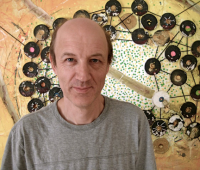 Please Join us for a talk entitled:
Please Join us for a talk entitled: Please Join us for a talk entitled:
Please Join us for a talk entitled:
Origins of the Oceans
with David Jewitt, UCLA
Earth formed hot and probably dry, acquiring its water and other volatiles after the accretional phase. Possible sources for terrestrial water include the comets from the Kuiper belt, asteroids from the main-belt and water-bearing dust from beyond the Earth's orbit. I will discuss recent developments in understanding the origin of the oceans and other terrestrial-planet volatiles.
David C. Jewitt is a professor of astronomy in the Earth and Space Science Department of UCLA. He was born in 1958 in England, and is a 1979 graduate Of University College, London (UCL). Jewitt received an M.Sc. and a Ph.D. in astronomy at the California Institute of Technology in 1980 and 1983, respectively. His research interests cover all aspects of the solar system, including the trans-Neptunian Solar System, Solar System formation, ice in the asteroids and the physical properties of comets. Along with Jane Luu, he discovered the first Kuiper Belt object in 1992 and subsequently identified dozens of additional belt members in a series of pioneering wide field surveys. From these, he discovered that the belt is dynamically divided into regions - the Classical Kuiper belt (circular, uninclined orbits, exemplified by 1992 QB1), the Scattered Kuiper Belt (also called Scattered Disk: large elliptical orbits with perihelion near Neptune, discovered in 1997) and the resonant objects (whose periods are related simply to Neptune's). The resonant objects in the 3:2 mean-motion resonance he called "plutinos" as a reminder that Pluto is one such object. These resonant objects can only be explained if Neptune migrated outwards, opening the door to new models of the solar system in which unsuspected planet-disk and planet-planet interactions can be important.
Tuesday, February 5th, CNS 206B @ 12:10 p.m.
Pizza and Refreshments will be available for $1. Please bring your own cup. Remember to Recycle, Reuse, Reduce.
Individuals with disabilities requiring accommodations should contact the department assistant at jackerman@ithaca.edu. We ask that requests for accommodations be made as soon as possible.
https://www.ithaca.edu/intercom/article.php/20130123144041875